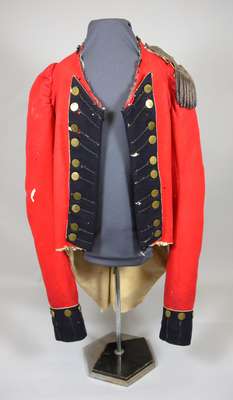British Uniform Coat Worn by Fort Major Donald Campbell- c.1810
Description
- Sponsors

 This item is a part of the 1812 History digitization project. This project was made possible with the support of the Department of Canadian Heritage through the Canadian Culture Online Strategy.
This item is a part of the 1812 History digitization project. This project was made possible with the support of the Department of Canadian Heritage through the Canadian Culture Online Strategy.- Media Type
- Object
- Description
- This coat was worn by Fort Major Donald Campbell who was buried at Fort George in December 1812. The red wool coat with black flannel wool is a very early type, common shortly after 1800. It features blue facings, buttons in pairs, a rounded cut at the waist and white piping. The high stand-up collar is missing and adjustable lapels. There is a silver epaulet at the left shoulder, but it isn't known whether this is original to the coat. There is also a false pocket on the back.
Being the Fort-Major of Fort George (an administrative position) meant you worked directly for the British army and did not report to any particular regiment. Your rank might not even be major. It was usually more junior. As Fort-Major, Campbell could have worn a coat of one of his previous regiments. None of them, however, had blue facings and paired buttons. There is also the possibility that Campbell bought this coat from another officer. It does resemble the warrant for the 10th Royal Veterans Battalion, who were in Canada at that time. It is more likely that this coat was made for Campbell in a generic British officer's style. There appears to be no specific uniform requirement for his position. Campbell had a long and wide-ranging career in the military. In his senior years, the position as Fort-Major would have been very welcome.
His family lived with him in Niagara. Campbell died of unknown causes in December 1812, at age 57 and was buried in the central west bastion of Fort George. Campbell's son tried to buy his father's burial plot many years later. It isn't known if the burial site was disturbed during reconstruction of Fort George during the 1930's. The Campbell family suffered through the trials of war in Niagara. They lost a loved one, were caught in the middle of the Battle of Fort George (May 27, 1813), endured American occupation and were burnt out, along with the rest of the town on December 10, 1813. - Date of Original
- c. 1810
- Dimensions
-
Width: 38 cm
Length: 88 cm
- Subject(s)
- Local identifier
- 972.903
- Geographic Coverage
-
-
Ontario, Canada
Latitude: 43.252777 Longitude: -79.051388
-
- Recommended Citation
- Image courtesy of the Niagara Historical Society & Museum
- Terms of Use
- Please contact the Niagara Historical Society & Museum for any reproductions of this image.
- Contact
- Niagara Historical Society MuseumEmail:contact@niagarahistorical.museum
Website:
Address:43 Castlereagh Street
P.O. Box 208
Niagara-on-the-Lake, ON
L0S 1J0


